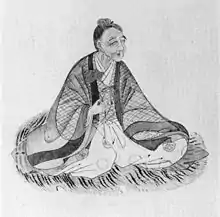Matsunaga Teitoku | |
|---|---|
松永 貞徳 | |
 | |
| Born | 1571 |
| Died | 1654 |
| Other names | 長頭丸 (Tyōzumaru) 逍遊軒 (Syōyūken) |
| Era | Edo period |
| Children | Matsunaga Sekigo |
| Parent |
|
Matsunaga Teitoku (松永 貞徳, 1570-1653) was a Japanese haikai and waka poet. As a teacher of Teimon Haikai, he spread haikai throughout Japan. He was considered by R H Blyth to be the most important of Matsuo Bashō's predecessors.[1]
Achievements
Teitoku played a significant role in regularising the rules for Haikai, and in raising its importance and status as a genre.[2] He specialised in elegant wordplay, and in subject-matter reflecting the Chinese classics and waka.[3]
Through his disciples in the Teimon school, he influenced succeeding generations of haiku poets: thus for example Bashō's first haiku teacher, Kigin, came from his school.[4]
Criticism
Teitoku's approach was criticised by the Danrin school for shallowness and excessive wordplay.[5] One member, Bashō himself, is reported to have said of its founder, Nishiyama Sōin, that, if not for him, "we would still be licking the slaver of aged Teitoku".[6]
See also
References
- ↑ R H Blyth, A History of Haiku Vol I (1963) p. 67
- ↑ R H Blyth, A History of Haiku Vol I (1963) p. 67
- ↑ Nobuyuki Yuasa trans., The Narrow Road to the Deep North (1983) p. 17
- ↑ Nobuyuki Yuasa trans., The Narrow Road to the Deep North (1983) p. 20-1
- ↑ Makoto Ueda, Matsuo Bashō (1982) p. 38-40
- ↑ Nobuyuki Yuasa trans., The Narrow Road to the Deep North (1983) p. 24